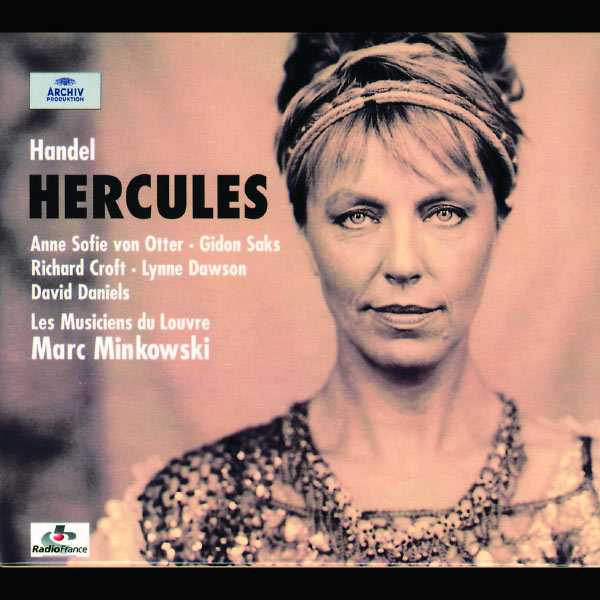
Composer: George Frideric Handel
Performer: Michel Maldonado, Yvon Repérant, Lynne Dawson, David Daniels, Anne Sofie von Otter, Claire Giardelli, Mirella Giardelli, Richard Croft, Gidon Saks, Marcos Pujol, Sébastian Rouland
Orchestra: Musiciens du Louvre
Conductor: Marc Minkowski
Number of Discs: 3
Format: FLAC (tracks)
Label: Archiv
Catalogue: E4695322
Release: 2002
Size: 746 ЬИ
Recovery: +3%
Scan: cover
Hercules, HWV 60
CD 01
01. Overture
02. Menuetto
Act 1
03. Recit. acc. “See with what sad dejection”
04. Aria: “No longer, Fate, relentless frown”
05. Recit. acc.: “O Hercules! why art thou absent from me”
06. Aria: “The world, when day’s career is run”
07. Recit: “Princess! be comforted, and hope the best”
08. Aria: “I feel, I feel the god”
09. Recit.: “He said, the sacred fury left his breast”
10. Aria: “There in myrtle shades reclined”
11. Recit.: “Despair not; but let rising hope suspend”
12. Aria: “Where congealed the northern streams”
13. Chorus: “O filial piety! O generous love!”
14. Recit.: “Banish your fears!”
15. Aria: “Begone, my fears, fly, hence, away”
16. Recit: “A train of captives, red with honest wounds”
17. Aria: “The smiling hours”
18. Chorus: “Let none despair”
19. March
20. Recit: “Thanks to the powers above”
21. Aria: “My father! Ah! methinks I see”
22. Recit.: “Now farewell, arms!”
23. Aria: “The god of battle”
24. Recit.: “Ah me! How soon the flatterer hope”
25. Aria: “Daughter of gods, bright liberty”
26. Chorus: “Crown with festal pomp the day”
CD 02
Act 2
01. Sinfonia
02. Recit.: “Why was I born a princess”
03. Aria: “How blest the maid ordained to dwell”
04. Recit.: “It must be so”
05. Aria: “When beauty sorrow’s liv’ry wears”
06. Recit: “Whence this unjust suspicion?”
07. Aria: “Ah! think what ills the jealous prove”
08. Recit: “It is too sure that Hercules is false”
09. Recit.: “In vain you strive”
10. Chorus: “Jealousy! Infernal pest”
11. Recit: “She knows my passion”
12. Aria: “Banish love from thy breast”
13. Recit.: “Forgive a passion”
14. Aria: “From celestial seats descending”
15. Chorus: “Wanton god of amorous fires”
16. Recit.: “Yes, I congratulate”
17. Aria: “Alcides’ name in latest story”
18. Recit.: “O glorious pattern of heroic deeds!”
19. Aria: “Resign thy club and lion’s spoils”
20. Recit: “You are deceived! Some villain has belied”
21. Aria: “Cease, ruler of the day, to rise”
22. Recit: “Some kinder power inspire me to regain”
23. Aria: “As stars, that rise and disappear”
24. Recit.: “But see, the princess Iole”
25. Duet: “Joys of freedom, joys of power”
26. Recit.: “Father of Hercules”
27. Chorus: “Love and Hymen”
CD 03
Act 3
01. Sinfonia
02. Recit: “Ye sons of Trachin, mourn you valiant chief”
03. Aria: “O scene of unexampled woe”
04. Chorus: “Tyrants now no more shall dread”
05. Recit. acc: “O Jove! what land is this”
06. Recit: “Great Jove! relieve his pains!”
07. Aria: “Let not fame the tidings spread”
08. Recit. acc: “Where shall I fly?”
09. Recit: “Lo! the fair fatal cause of all this ruin!”
10. Aria: “My breast with tender pity swells”
11. Recit: “Princess, rejoice! whose heaven-directed hand”
12. Aria: “He, who for Atlas prop’d the sky”
13. Recit: “Words are too faint”
14. Duet: “O prince, whose virtues all admire”
15. Recit.: “Ye sons of freedom”
16. Chorus: “To him your grateful notes of praise belong”
Hercules has never quite occupied the place it merits in the Handel canon, even though it includes some of his most powerfully dramatic music. This is understood by Marc Minkowski, whose intentions towards the work are made clear frm the start of the Overture. But he’s also intent on maintaining its dramatic pace and emphasising its range of feeling. His cast is well able to share his dramatic vision. Von Otter excels as Dejanira. This, rather than Hercules himself, is the central role, carrying the work’s chief expressive weight. There’s some beautifully shaped singing as in her opening air she mourns Hercules’ absence, and she copes well with Minkowski’s demanding tempo in ‘Begone, my fears’. Lynne Dawson makes a delightful Iole, crystalline, airy, rhythmic, but able to call on more intensity where needed. ‘My breast with tender pity swells’ is truly lovely. Lichas’ music is done with refinement but also vigour by David Daniels. Richard Croft, though often hurried by Minkowski, sings much of Hyllus’ music with elegance, and his delicate sustained pianissimo in the da capo of ‘From celestial seats descending’, one of the most inspired pieces in the score, is remarkable. The choral singing is strong, secure, responsive, though the French choir is rather less euphonious than the best English ones. The orchestral playing is duly alert. This account benefits from fewer cuts than his rival Gardiner and superior solo singing.